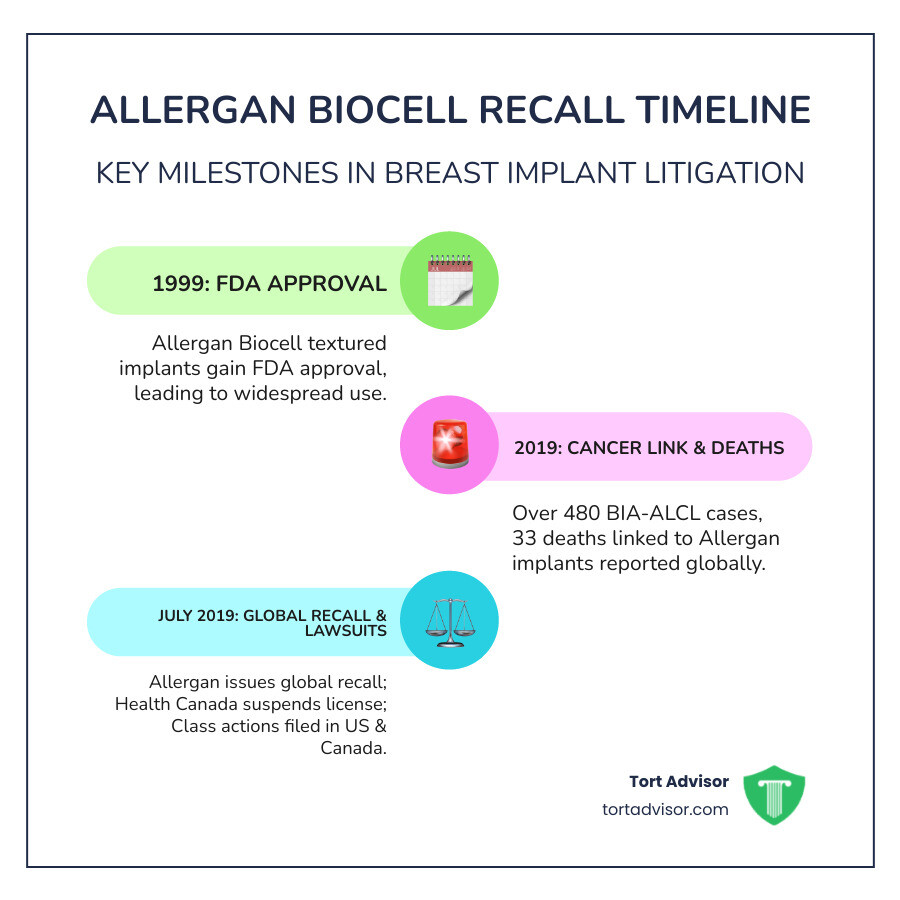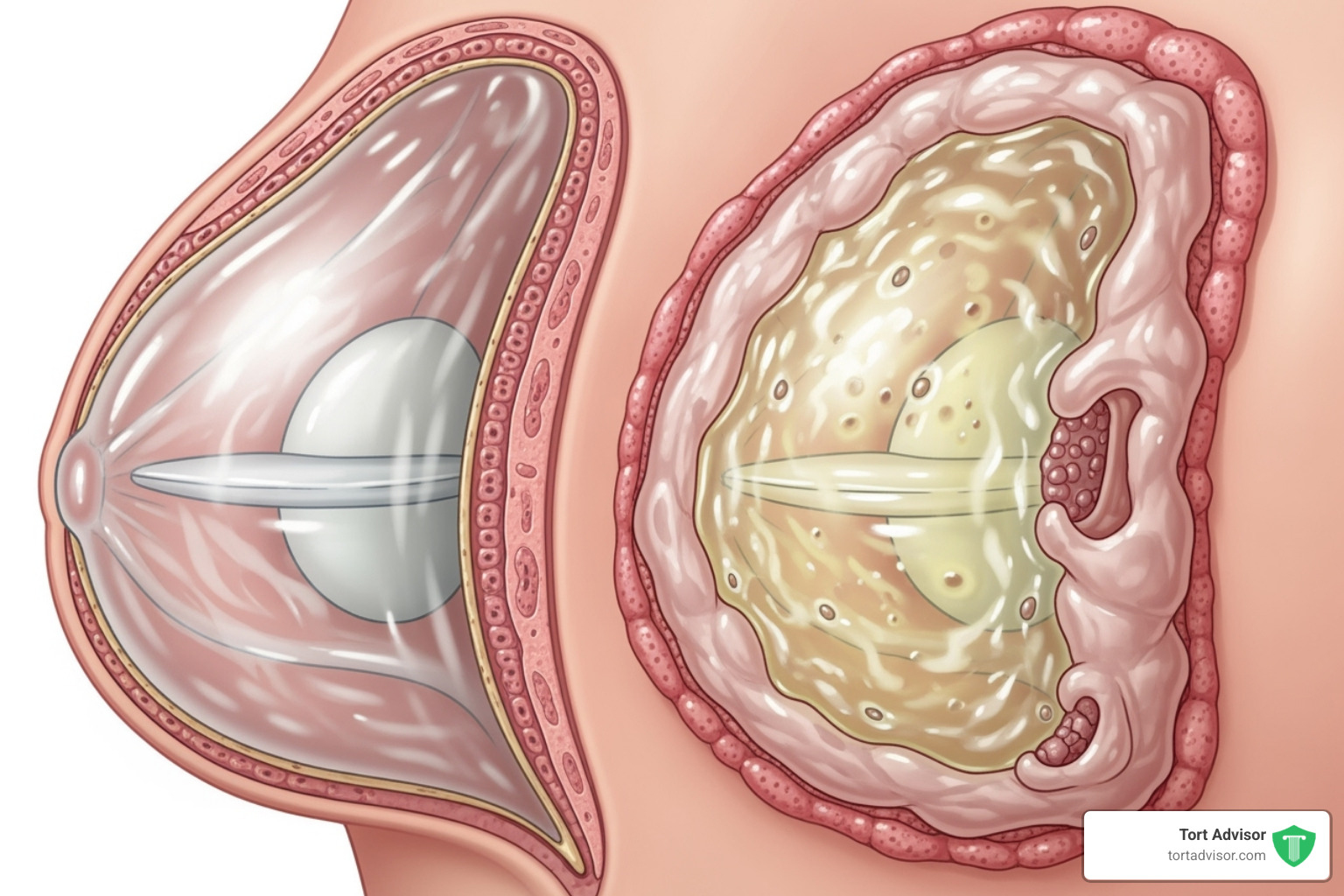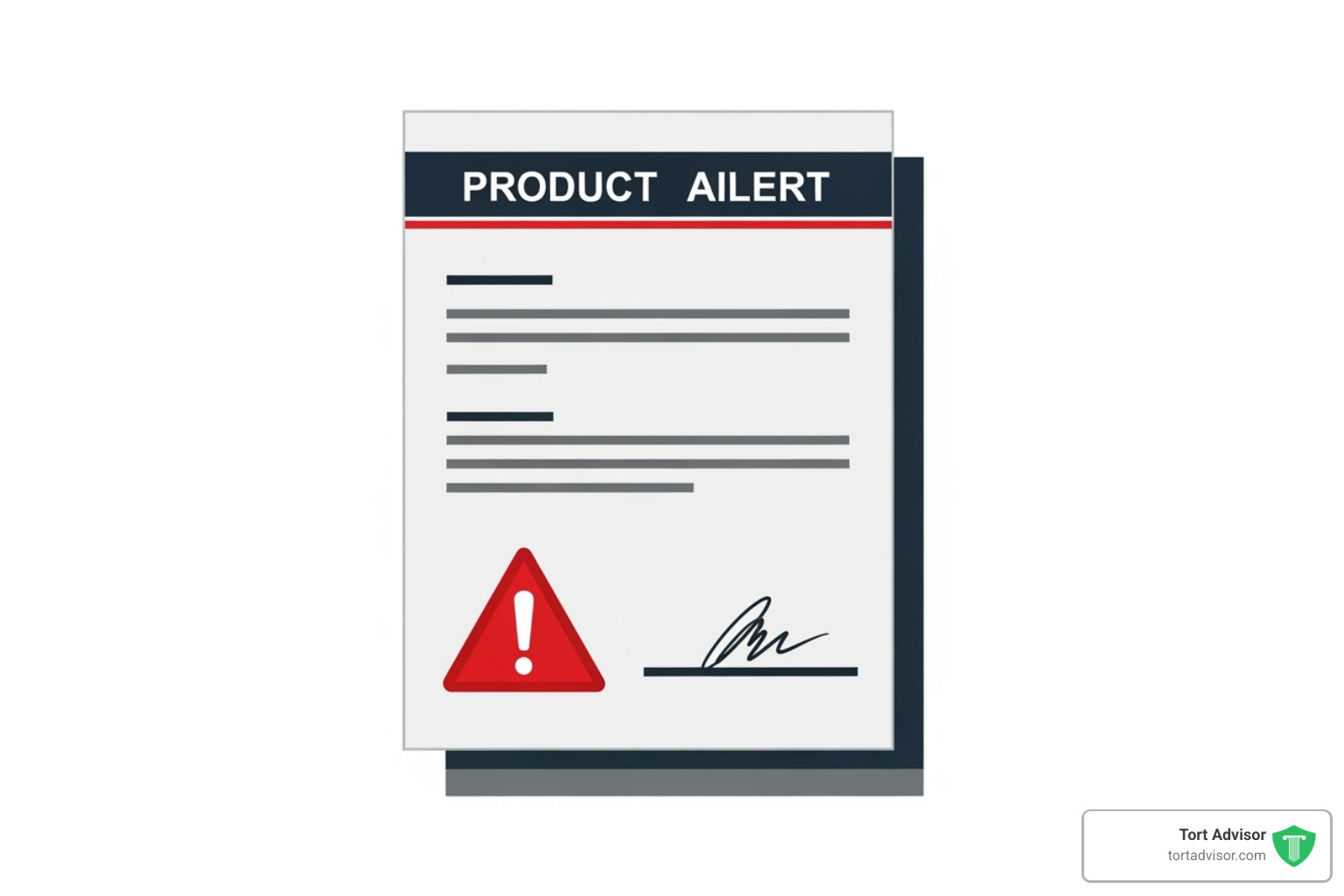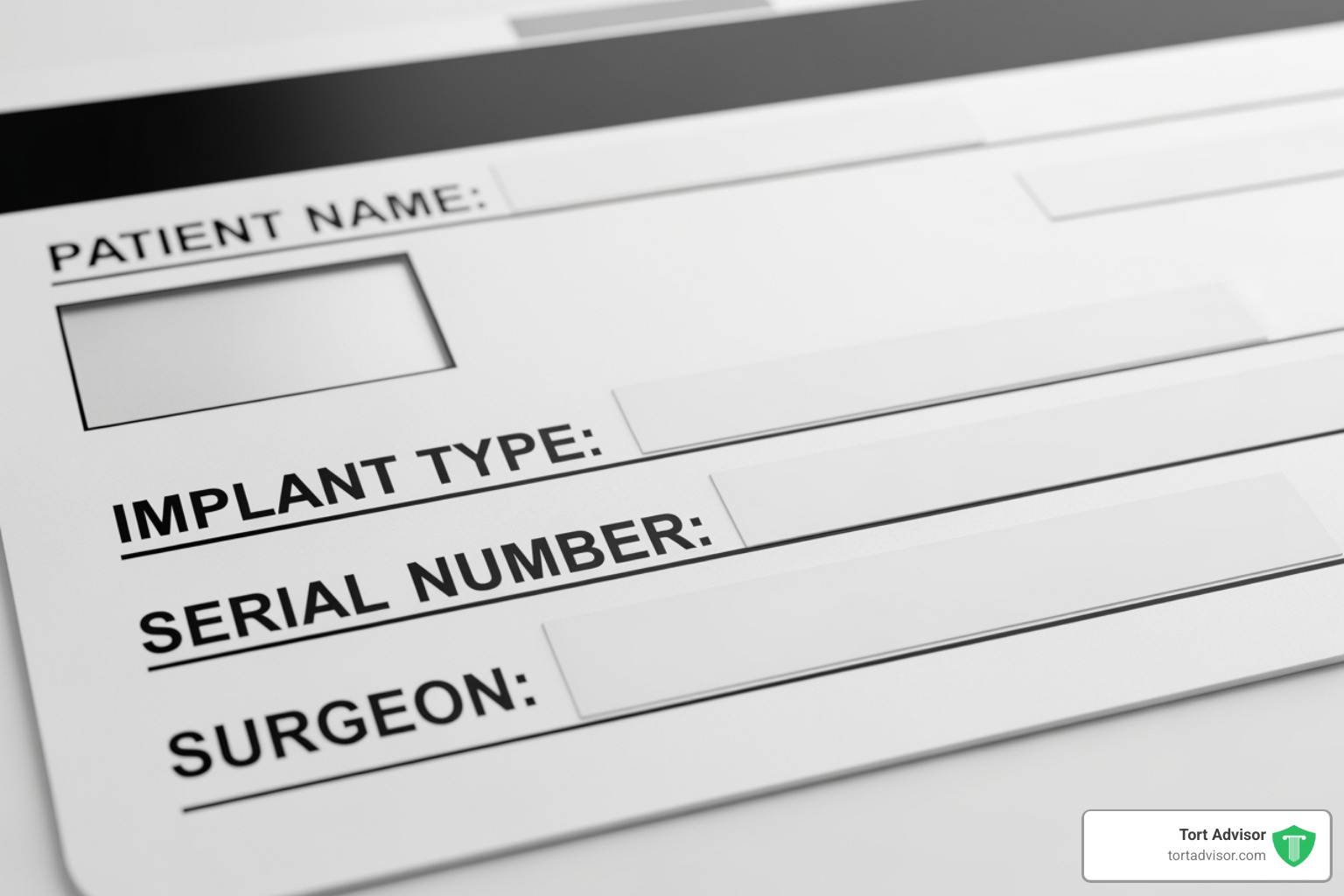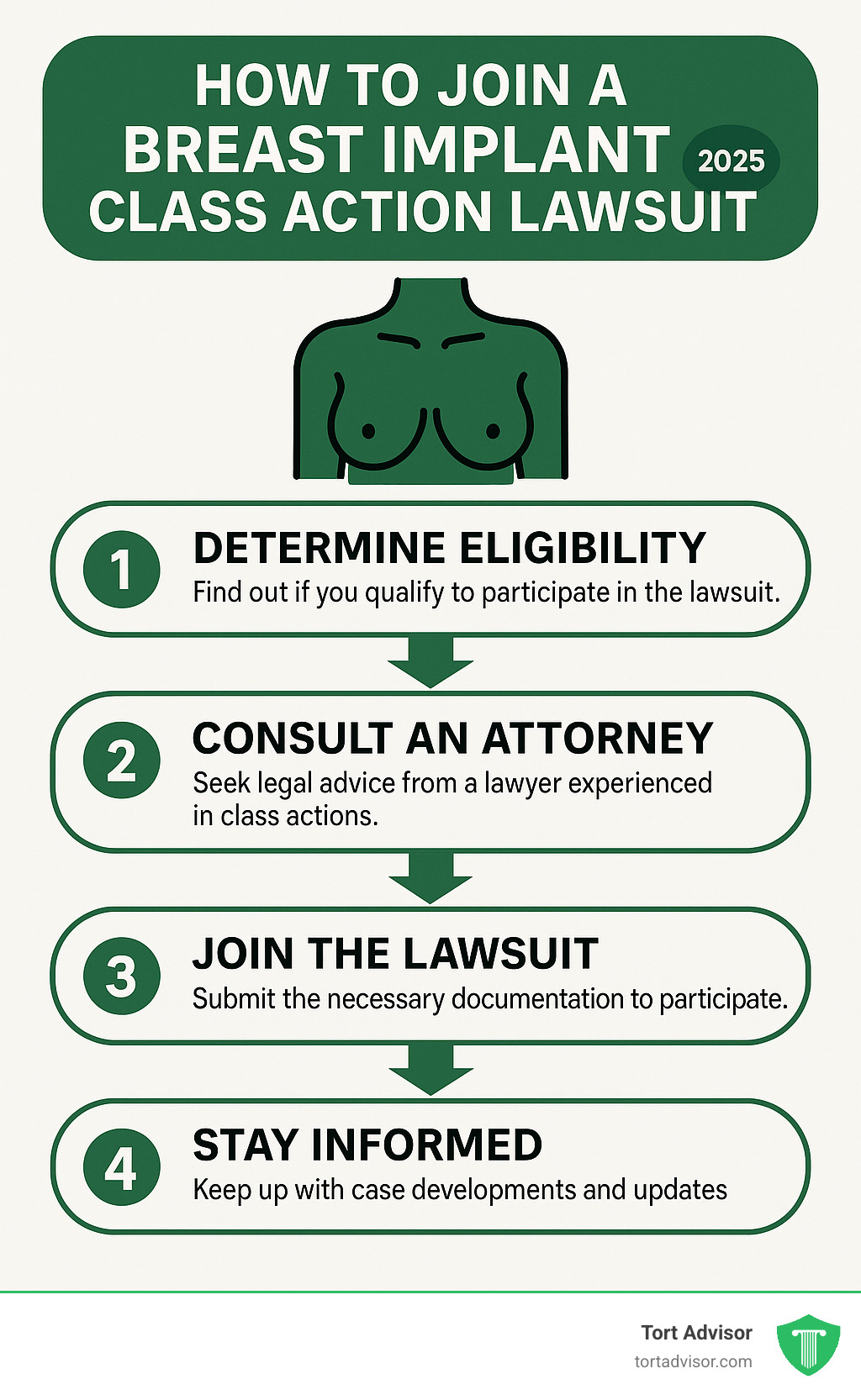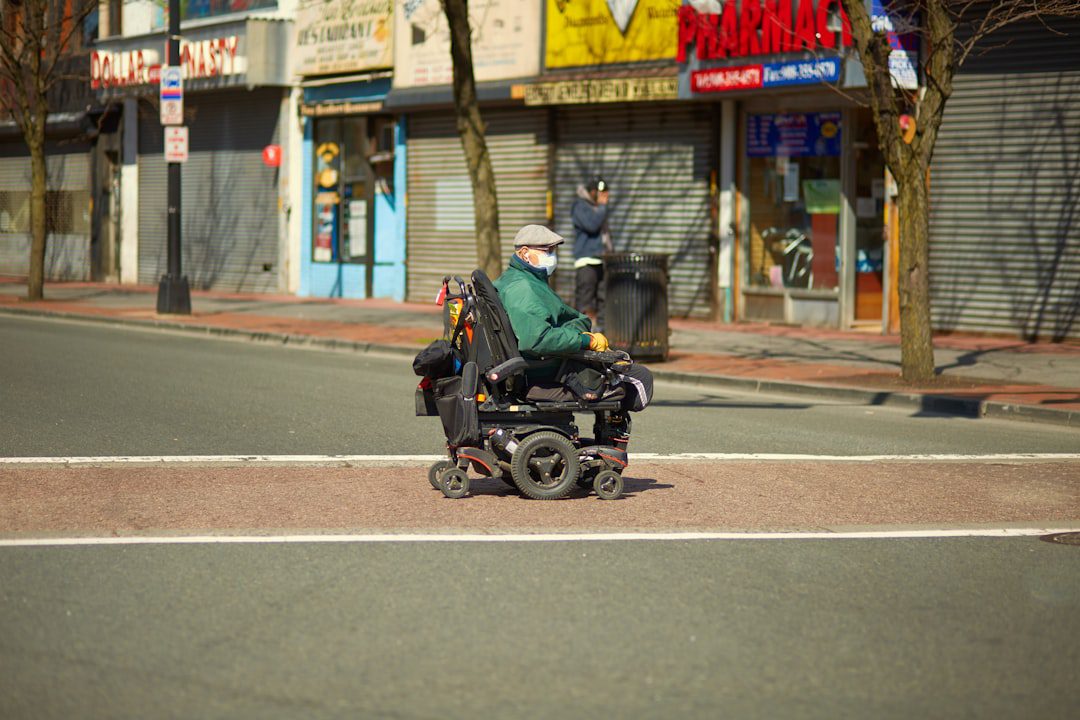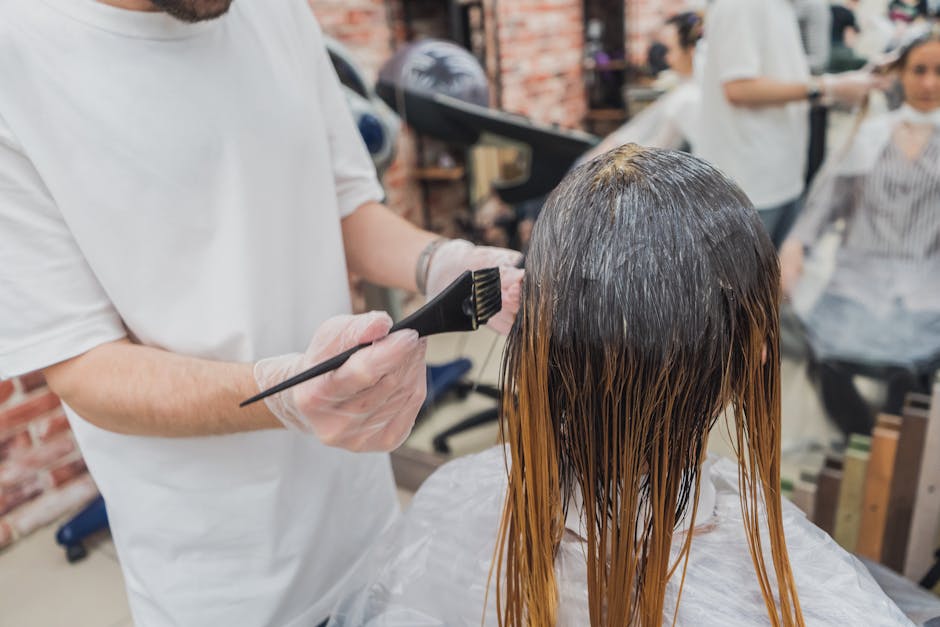


Understanding Your Legal Rights After Recalled Breast Implants
A breast implant class action lawsuit can provide compensation for individuals harmed by defective medical devices, particularly those who received Allergan’s recalled Biocell textured implants linked to cancer. These lawsuits allow large groups of affected patients to combine their cases against manufacturers who failed to warn about serious health risks.
Key Facts About Breast Implant Class Action Lawsuits:
- Primary Target: Allergan’s Biocell textured breast implants recalled in 2019
- Main Health Risk: BIA-ALCL (Breast Implant-Associated Anaplastic Large Cell Lymphoma) – a rare immune system cancer
- Eligibility: Patients implanted with specific Allergan products between 1999-2019
- No Upfront Costs: Attorneys work on contingency fee basis
- Current Status: Active litigation in US federal court (MDL) and certified class actions in Canada
- Potential Compensation: Medical monitoring, removal surgery costs, replacement implants, pain and suffering
The statistics are alarming. People with Allergan’s Biocell textured products were six times more likely to develop BIA-ALCL than those with textured implants from other manufacturers. Of 573 worldwide BIA-ALCL cases reported as of 2019, 481 were linked to Allergan implants, including 33 deaths.
These lawsuits hold manufacturers accountable for prioritizing profits over patient safety. Many women state they would not have chosen these implants if properly warned of the cancer risks.
Connecting individuals with legal resources has shown how breast implant class action lawsuit cases can provide both justice and financial relief for those harmed by defective medical devices. Understanding your rights is crucial when facing serious health issues caused by recalled products.
Handy breast implant class action lawsuit terms:
- breast cancer class action lawsuit
- breast implant recall 2023
The Link Between Textured Implants and Cancer: Understanding BIA-ALCL
If you have textured breast implants, you may have heard about BIA-ALCL. Understanding this condition is key to making informed health decisions.
BIA-ALCL stands for Breast Implant-Associated Anaplastic Large Cell Lymphoma. It is a rare immune system cancer, a form of non-Hodgkin lymphoma, and is not breast cancer. It typically develops in the scar tissue capsule around the implant. The World Health Organization classifies BIA-ALCL as a T-cell lymphoma. Its connection to textured implants, especially Allergan’s Biocell products, is a serious concern.
Symptoms and Other Health Risks
Recognizing the warning signs of BIA-ALCL is critical, as symptoms can develop years after implantation.
Persistent swelling is often the first red flag. If one breast suddenly becomes larger than the other, or if you notice ongoing swelling around your implant, don’t ignore it. Pain near the implant that doesn’t go away is another warning sign.
Other symptoms include lumps in your breast or armpit, fluid accumulation around the implant (called a seroma), redness or warmth in the breast area, and changes in breast shape or size. If you experience any of these symptoms, see your doctor immediately. Early detection is crucial.
Beyond BIA-ALCL, many women with breast implants report experiencing Breast Implant Illness (BII), also known as ASIA Syndrome. While the medical community is still researching BII, thousands of women describe similar clusters of symptoms including chronic fatigue, joint and muscle pain, brain fog, hair loss, skin rashes, and even autoimmune disorders like lupus or rheumatoid arthritis.
There’s also the risk of premature rupture, which can lead to additional surgeries and complications. Being informed helps you advocate for your health and seek appropriate medical care.
For detailed medical information about symptoms, the FDA’s information on BIA-ALCL symptoms provides reliable guidance.
Textured vs. Smooth Implants
The texture of your breast implants is a critical distinction at the heart of the breast implant class action lawsuit against Allergan.
Allergan’s Biocell implants feature a macro-textured surface, similar to coarse sandpaper. This rough surface was designed to help the implant adhere to surrounding tissue, supposedly reducing the risk of rotation or capsular contracture.
However, that same rough texture appears to create chronic irritation and inflammation. Some researchers believe it may also trap bacteria, creating the perfect storm for BIA-ALCL to develop. The numbers don’t lie – Allergan’s textured products were six times more likely to cause BIA-ALCL than textured implants from other manufacturers.
Smooth implants have a soft, slick surface that allows them to move more naturally within the breast. While no implant is completely risk-free, smooth implants have not been linked to BIA-ALCL with the same frequency as textured ones.
| Feature | Textured Breast Implants | Smooth Breast Implants |
|---|---|---|
| Surface Type | Rough, like sandpaper; designed for tissue adherence | Soft, slick, smooth surface |
| Adhesion to Tissue | High; designed to stick to surrounding tissue | Low; moves freely within the breast pocket |
| Associated BIA-ALCL Risk | Significantly higher, especially with macro-textures | Lower; not commonly associated with BIA-ALCL |
Understanding these differences can help you have informed conversations with your doctor. If you’re dealing with health issues related to textured implants, legal help may be available.
The Allergan Recall and Subsequent Breast Implant Class Action Lawsuit
In July 2019, following pressure from the U.S. Food and Drug Administration, Allergan announced a global recall of its Biocell textured breast implants and tissue expanders. The FDA designated it a Class I recall, the most serious type, indicating a reasonable probability of serious health problems or death from using the products.
The recall followed Health Canada’s suspension of Allergan’s licenses for Biocell implants earlier that year due to the same cancer concerns. The data was becoming impossible to ignore, linking these implants to a significantly higher risk of BIA-ALCL.
For complete details about the recall, you can review Health Canada’s recall announcement and details, which provides comprehensive information about the affected products.
Allegations and Current Lawsuit Status
The breast implant class action lawsuit against Allergan centers on the claim that the company knew, or should have known, about the risks but failed to properly warn patients and doctors. Plaintiffs allege Allergan:
- Failed to adequately warn about the severe BIA-ALCL risk.
- Was negligent in design and manufacturing, prioritizing features without disclosing long-term safety implications.
- Used misleading marketing claims to promote benefits without sufficient scientific backing.
- Downplayed known risks while failing to conduct proper post-market surveillance.
These allegations suggest profits were prioritized over patient safety, leaving women with a higher cancer risk than they knew.
The recall affected numerous Allergan Biocell products, including Natrelle Saline-Filled Breast Implants with textured surfaces, Natrelle 410 Truform Silicone-Filled Breast Implants, Natrelle Silicone-Filled Breast Implants with Biocell Round texturing, Natrelle Inspira Truform 1 and 2 Breast Implants with textured shells, and various Biocell textured tissue expanders.
In the United States, federal lawsuits were consolidated into a U.S. Multidistrict Litigation (MDL) in New Jersey in December 2019. This streamlines the legal process for the over 1,200 cases pending as of September 2024 and often leads to global settlements.
Meanwhile, a breast implant class action lawsuit against Allergan has been certified in Canada, allowing individuals in British Columbia, Ontario, Quebec, and other provinces to pursue claims collectively. This is a significant victory, making it easier for individuals to seek justice against a major corporation.
These legal proceedings aim to hold Allergan accountable and prevent future harm.
For more detailed information about potential outcomes and current developments, you can learn more about the Allergan Textured Implant Lawsuit Settlement.
How a Class Action Lawsuit Works and Who Is Eligible
A breast implant class action lawsuit provides strength in numbers, allowing people harmed by the same product to join forces against a large corporation like Allergan. This collective approach makes legal action more accessible and powerful than individual lawsuits.
The benefits are significant: legal costs are shared, which provides access to high-quality representation; plaintiffs gain leverage against the defendant; and it provides a path to justice for those whose individual damages might not justify a solo lawsuit. This method is particularly effective for defective medical device cases like the Allergan breast implant recall.
Understanding a Breast Implant Class Action Lawsuit
Eligibility for a breast implant class action lawsuit is straightforward. You may qualify if you were implanted with recalled Allergan Biocell products—including their textured saline implants, Natrelle 410 implants, or various tissue expanders—typically between May 1999 and May 2019.
You don’t need to be sick to be eligible. Many people qualify because they have these recalled devices and require ongoing medical monitoring due to the increased cancer risk. Whether you have symptoms or are currently symptom-free, you may have a valid claim.
Family members can sometimes participate too. If a loved one suffered severe complications or passed away due to BIA-ALCL, you might have claims for loss of consortium or wrongful death.
There are no upfront costs to join. Attorneys handling these cases work on a contingency fee basis, meaning they only get paid if you receive compensation. Their fee is a percentage of any settlement or award. If the case is unsuccessful, you owe nothing for legal services.
Joining vs. Opting Out
If you meet the criteria for a certified class action, you’re automatically included and will be bound by the outcome, receiving a share of any compensation.
However, you can “opt out” if you prefer to pursue your own individual lawsuit. This might make sense if your damages are substantially higher than what a class settlement might provide or if you want more control over your case. Opting out means you bear all legal costs and risks yourself and must prove your case independently.
Pay close attention to deadlines. Courts set strict opt-out deadlines. For the Canadian Allergan class action, you must decide by June 30, 2025. If you miss this date, you remain in the class action.
If you’re considering your options, the Official Canadian Class Action Website with opt-out forms provides all the official notices and forms you need.
Your Rights and Next Steps: Navigating the Legal Process
If you have Allergan Biocell textured implants, understanding your rights and next steps is crucial. The first step is to identify your implants, as many people are unsure of the specifics of their devices.
Here’s how to find out what type of implants you have:
- Check your medical device card: This is the most reliable source and should contain the manufacturer, texture type, and serial/model numbers.
- Review your surgical records: Your surgeon’s office or the hospital must keep detailed records of the implants used.
- Contact your surgeon’s office: They are often the best resource for obtaining this crucial information.
What to Do If You Are Affected
If you have Allergan Biocell implants, whether you have symptoms or are concerned about the recall, here are the recommended steps:
- See a doctor immediately. Your health comes first. Consult with a healthcare provider who understands implant-related illnesses.
- Get a formal diagnosis. This is crucial for your health and any potential legal claim. Ensure your doctor documents all symptoms, tests, and findings.
- Keep detailed records. Maintain a comprehensive file of all medical records, doctor’s visits, test results, diagnoses, treatments, and related expenses, including lost wages.
What compensation is available in the breast implant class action lawsuit?
Compensation in a breast implant class action lawsuit aims to cover the costs and impacts you’ve suffered due to the allegedly defective implants. Potential compensation can include:
- Medical monitoring costs for ongoing health check-ups.
- Diagnostic testing expenses for imaging, biopsies, or other tests.
- Implant removal surgery (explantation) costs.
- Safer replacement implant costs.
- Lost wages if your symptoms have affected your ability to work.
- Pain and suffering and emotional distress for the fear, anxiety, and impact on your quality of life.
The goal is to ensure you are not financially burdened by the consequences of a manufacturer’s alleged negligence. For more information about active lawsuits and the types of compensation being sought, you can research active lawsuits.
Frequently Asked Questions about Breast Implant Lawsuits
It’s natural to have questions when considering a breast implant class action lawsuit. Here are answers to the most common concerns.
Do I have to pay to join a breast implant class action?
No, you typically don’t have to pay anything upfront to join a breast implant class action lawsuit. Attorneys handling these cases operate on a contingency fee structure. They take on the financial risk of the case, and their legal fees are only paid as a percentage of the compensation you receive if the case is won. If the case is unsuccessful, you owe nothing for their legal services. This system ensures everyone has access to legal representation.
What if I don’t have any symptoms of BIA-ALCL?
Even without symptoms, you may still have a valid claim in a breast implant class action lawsuit. The risk exists regardless of symptoms. If you have Allergan’s recalled Biocell implants, you are living with devices linked to cancer, which creates recognized damages.
- Medical monitoring: You may be entitled to compensation for ongoing health screenings to detect BIA-ALCL early.
- Explantation surgery: You might be eligible for compensation to cover the costs of removing the recalled implants and potentially replacing them.
- Psychological impact: The anxiety, fear, and emotional distress of living with a higher cancer risk are often recognized as compensable damages.
The FDA provides helpful information for patients and providers to consider when discussing next steps, including its recommendation for asymptomatic patients.
How long will the lawsuit take to resolve?
Complex litigation like this typically takes several years to resolve. Understanding the process can help set realistic expectations. These cases involve extensive work, including document review and expert testimony. The Multidistrict Litigation (MDL) process streamlines similar cases, and bellwether trials (test cases) can help influence global settlement negotiations. While the timeline can be long, a global settlement can provide compensation to all eligible members more quickly than individual trials.
Conclusion: Taking Control of Your Health and Legal Rights
Navigating the health implications of recalled breast implants can be overwhelming, but you are not alone. The Allergan Biocell recall is a major medical device safety issue, with the heightened risk of BIA-ALCL affecting thousands of women.
Allergan’s textured implants carried serious risks, and patients were often not properly warned. With a six times higher likelihood of developing BIA-ALCL, the danger was significant. Legal options are available through class action lawsuits to provide financial relief and hold manufacturers accountable for prioritizing profits over patient safety. Joining these efforts sends a powerful message against such corporate behavior.
We’ve covered the essential information you need: understanding BIA-ALCL, the risks of textured implants, the recall details, and how class action lawsuits work. You now know about eligibility, your options, and the steps you can take.
Your health and peace of mind are paramount. If you have Allergan Biocell or any textured breast implants, we encourage you to stay informed, seek prompt medical advice for any symptoms, and consider legal counsel to understand your options.
At Tort Advisor, we specialize in connecting people like you with skilled attorneys who have proven results in complex cases like these. Our nationwide network gives you access to top-rated legal professionals who understand the intricacies of breast implant class action lawsuit cases.
These attorneys offer no-obligation consultations, so you can explore your options and get answers without financial commitment. There’s no risk in learning about your legal options, but there could be significant risk in waiting.
Don’t let uncertainty keep you from the justice you deserve. Your journey toward accountability can begin today.
Find out if you qualify for a personal injury lawsuit.
Free Confidential Case Evaluation
Complete the short form below to get an immediate FREE case review with an expert in your specific claim. Don't wait, your case could be time sensitive to file a claim.
Related Posts
Discover New Jersey disability benefits: TDI, FLI, SSDI, SSI rates, eligibility, applications & appeals for 2025-2026.
Hire a Depo-Provera lawsuit attorney now. Fight Pfizer for meningioma risks from injections. Free consult, MDL updates & settlements up to $1.5M.
Find top Miami florida car accident lawyers after your 305 crash. Get max compensation, navigate no-fault laws & choose the best experts now!
Diagnosed with cancer after Roundup? Learn about the monsanto roundup lawsuits, eligibility criteria, and how to pursue your claim.
Discover how do you qualify for a hair relaxer lawsuit: criteria, diagnoses, evidence & brands in uterine cancer MDL. Claim review now!
Find the best uber sexual assault lawsuit lawyer: expert guides, MDL experience, proven results & nationwide firms for justice.

